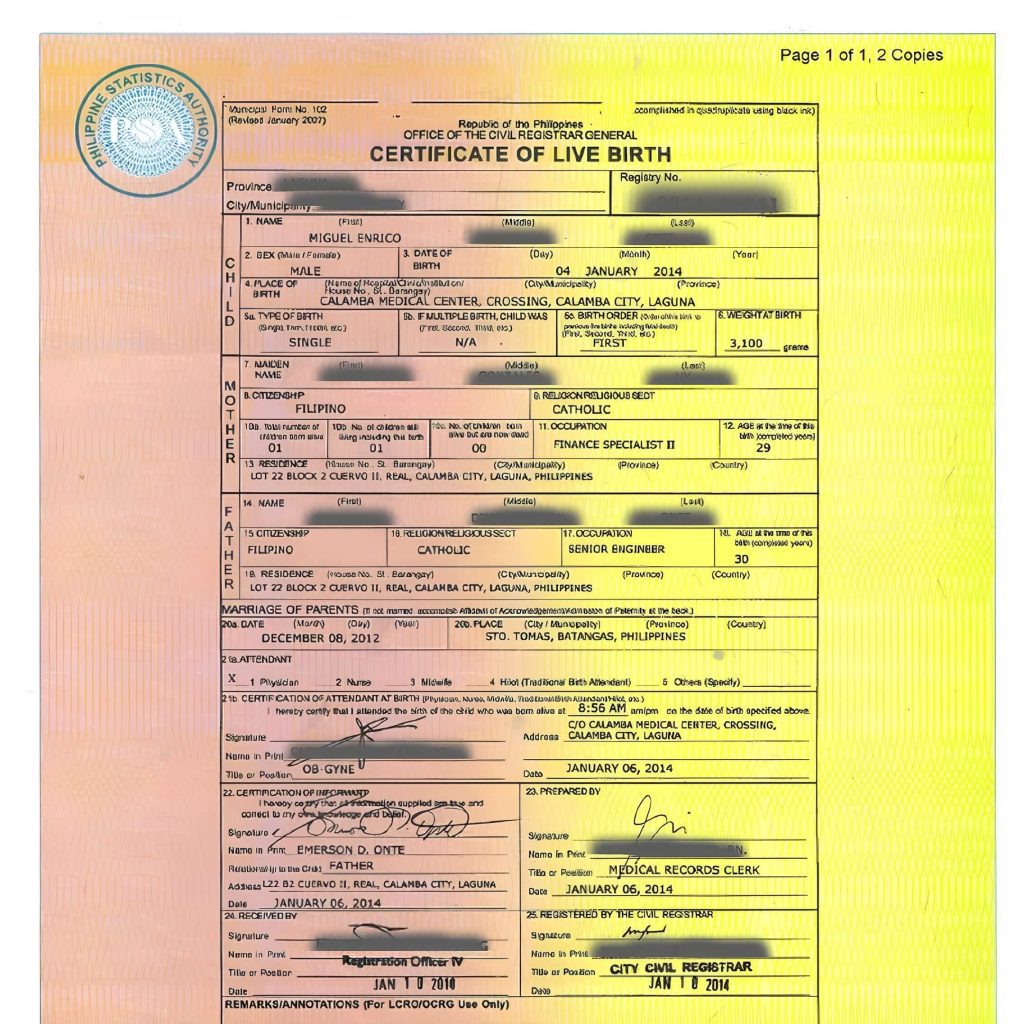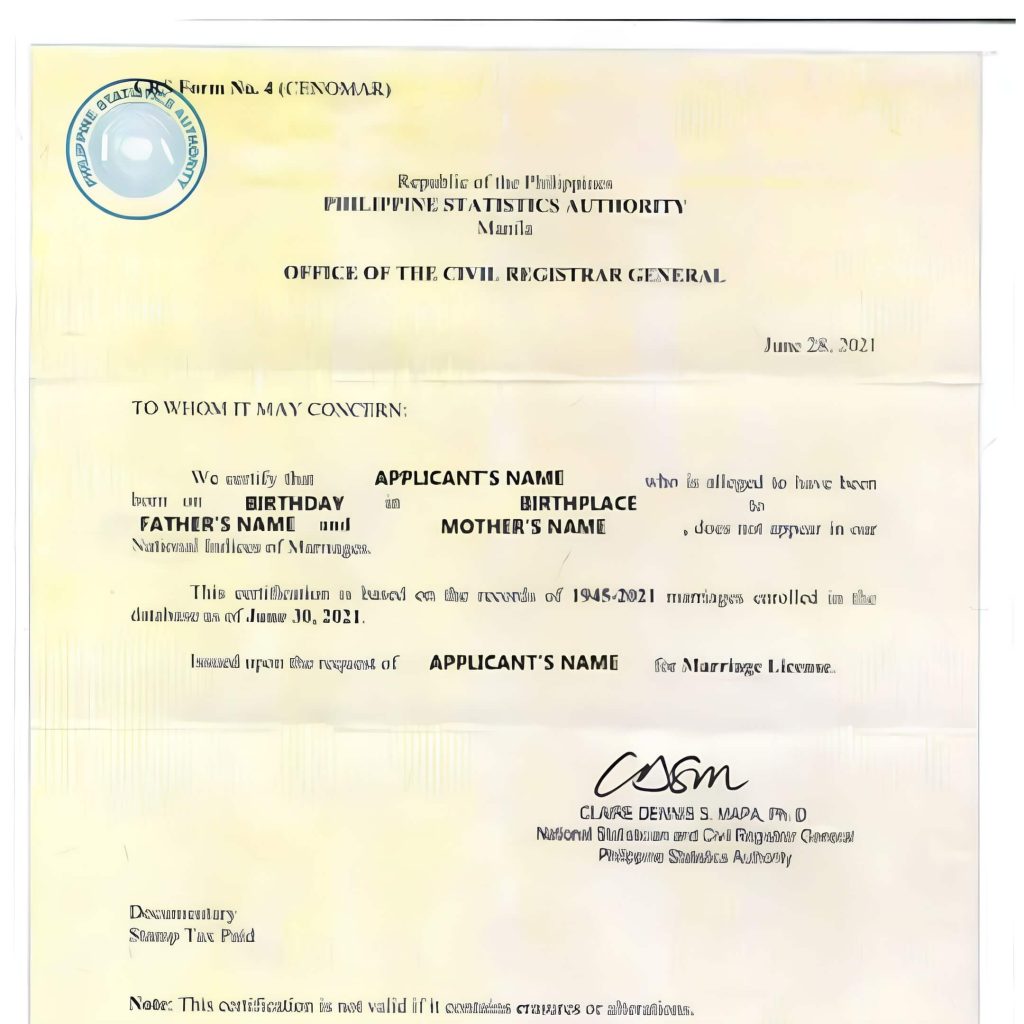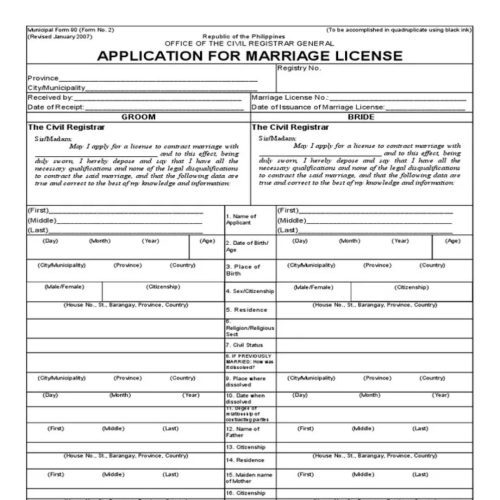

6 Simple Steps to Planning a Civil Wedding in the Philippines
Step-by-Step Guide to Civil Wedding in the Philippines
In the Philippines, the journey towards matrimony is more than just a legal process; it is a heartwarming embrace of Filipino love and cultural traditions. This unique journey reflects the deep-rooted commitment of Filipinos to their families and communities. The path to civil wedding in the Philippines is a testament to the significance of love, unity, and tradition in the lives of its people.
1. Secure Your Birth Certificates and CENOMAR
In the process of preparing for your wedding, acquiring the necessary documents and certificates is a crucial step to ensure a smooth and legal marriage. One of the fundamental documents you need to obtain is your official PSA (Philippine Statistics Authority) Birth Certificate. This document serves as concrete proof of your identity and is a requirement for civil wedding in the Philippines. It contains vital information such as your full name, date of birth, place of birth, and the names of your parents. Ensuring that you have a valid and up-to-date Birth Certificate is essential to avoid any complications during the marriage registration process.




Additionally, obtaining a Certificate of No Marriage (CENOMAR) is equally important for both partners. The CENOMAR is a document that certifies that neither party has any legal impediments or existing marriages that could hinder the solemnization of the marriage. It essentially confirms that you are both free to marry each other and that there are no legal obstacles in your path. This certificate is essential to prevent any potential legal issues or disputes that may arise after the marriage.
The process of acquiring these documents involves visiting the local PSA office or applying online through their official website. You will need to provide certain personal information and pay the necessary fees for the issuance of these certificates. It's important to double-check all the information on your Birth Certificate to ensure accuracy and to avoid delays in your wedding preparations. Likewise, obtaining a CENOMAR may require you to provide additional information and undergo background checks to verify your marital status.
2. Attend Pre-Marriage Counseling
Mandatory pre-marriage counseling sessions are a crucial step in the journey towards a healthy and successful marriage. These sessions, often required by the government, serve as a valuable resource for couples embarking on this life-changing journey. They are not meant to be seen as an intrusion into one's personal life but rather as a supportive measure aimed at equipping couples with the necessary skills and knowledge to navigate the challenges that may arise in their marriage.
One of the primary reasons for mandatory pre-marriage counseling is to ensure that couples have a clear understanding of the commitment they are making. Marriage is a significant life decision, and these sessions provide a structured platform for couples to discuss their expectations, values, and goals. This open and honest communication can help prevent misunderstandings and conflicts down the road. It also allows couples to explore any potential areas of disagreement and work on strategies for resolution.


Moreover, these counseling sessions often cover essential topics such as communication, conflict resolution, and financial management. These are key areas where many couples encounter difficulties in their marriages. By addressing these topics proactively, couples can develop strong foundations for their relationships. They learn effective communication techniques, which can foster better understanding and empathy towards each other's needs and concerns.
Another critical aspect of mandatory pre-marriage counseling is the emphasis on emotional preparedness. Marriage can be emotionally challenging, and these sessions help couples develop resilience and coping mechanisms. They encourage couples to explore their emotional readiness for civil wedding, addressing any unresolved issues or baggage from their past that may impact their relationship. This process can be cathartic and liberating, setting the stage for a healthier emotional connection.
3. Fill Out the Marriage License Application Form
After undergoing pre-marital counseling, the next crucial step in the process of getting married is to complete the marriage license application form. This form is a fundamental legal requirement that formalizes your intention to marry. It is essential to ensure that all the necessary details are accurately provided to avoid any delays or complications in the future. The marriage license serves as proof of your eligibility to marry and must be obtained before the wedding ceremony can take place.
One important thing to note about the marriage license is its validity period. Once issued, the marriage license is typically valid for 120 days. This means that you have a four-month window from the date of issuance to solemnize your civil wedding. Failing to do so within this timeframe may require you to reapply and go through the application process again. Therefore, it's essential to plan your wedding date within this window to ensure that your marriage remains legally valid.


Additionally, when applying for a marriage license, you will need to provide supporting documents to confirm your residential status and tax contributions. Among these documents is the Barangay Certification, which certifies that you are a resident of the Barangay where you plan to get married. This certificate serves as proof of your local residency and is a requirement for obtaining the marriage license.
Another crucial document is the Community Tax Certificate, commonly known as Cedula. This certificate is evidence that you have paid your community taxes, further confirming your compliance with local tax regulations. Both the Barangay Certification and the Community Tax Certificate are essential in establishing your eligibility to marry and ensuring that you are in good standing with local authorities.
4. Check Additional Requirements for Special Circumstances
In the Philippines, the process of getting married involves a few essential steps and requirements, especially for those aged 18-25. One of the significant aspects of Filipino culture is the emphasis on family values and respect for parental consent. Therefore, individuals within this age group who wish to marry are required to provide affidavits of parental consent. This demonstrates the importance placed on family dynamics and the need for the younger generation to seek approval from their parents or guardians before entering into civil wedding.
For those who have previously been married and are looking to marry again, there are additional requirements. They must present documents that prove their capacity to remarry. This typically includes providing a spouse's death certificate if they are widowed or presenting annulment papers if their previous marriage was legally dissolved. These documents are crucial in ensuring that individuals are free to enter into a new civil wedding without any legal hindrances.
Foreign nationals who wish to marry in the Philippines also have specific requirements to fulfill. They must obtain a Certificate of Legal Capacity to Marry from their respective embassies or consulates. This certificate attests that they are eligible and legally allowed to marry according to the laws of their home country. Additionally, it's important for foreign nationals to keep their passports and entry stamps ready for verification during the civil wedding application process. This helps ensure that their entry into the Philippines was legal and in compliance with immigration regulations.
5. Submit Your Documents and Await Approval
Submitting all collated documents to the local civil registrar is a crucial step in the process of getting married. This step typically involves gathering various essential documents, such as birth certificates, valid identification, and proof of residence, and presenting them to the civil registrar's office. These documents serve as evidence of your eligibility to marry and are essential for the official record-keeping of your civil wedding.


Once you've submitted the necessary documents, the local civil registrar initiates a ten-day public notice period. This waiting period is a legal requirement in many jurisdictions to allow any interested parties the opportunity to raise objections or concerns regarding your intended marriage. During this time, the details of your upcoming civil wedding, including your names and intended wedding date, are posted publicly. It is a precautionary measure to ensure that there are no legal impediments to your union.
After the ten-day notice period has elapsed without any objections or legal issues arising, your marriage license is issued. This license is a vital legal document that authorizes you and your partner to solemnize your civil wedding in the Philippines in the eyes of the law. It is essential to keep this license in a secure place, as it will be required during the wedding ceremony and for subsequent legal processes, such as changing your marital status on official documents.
6. Plan and Conduct Your Civil Wedding Ceremony
Once the legalities surrounding your wedding are settled, the next crucial step is to choose the perfect venue to host your special day. Selecting a venue is a pivotal decision, as it sets the stage for the entire celebration. Your choice should align with your vision for the wedding, accommodating the number of guests, the theme, and the overall atmosphere you desire. Whether it's an elegant ballroom, a rustic barn, a scenic beach, or an intimate garden, the venue should reflect your personality and style as a couple. It's essential to visit potential venues, ask questions, and consider factors like location, accessibility, and budget before making a final decision.


In creating a seamless experience, this guide aligns each necessary legal formality for a civil wedding in the Philippines with an easy-to-follow narrative, stripping away the layers of formality and revealing the simple steps beneath. It's about transforming what can often be a daunting prospect into a manageable and even enjoyable journey. The focus is on clarity and simplicity, ensuring that every couple is equipped with the knowledge and confidence to move forward.
In the heart of Quezon City, Light of Love Events Place not only provides a stunning venue but also the perfect canvas for your dreams to come to life. It is where tradition meets contemporary elegance, where your love story takes center stage, making it the ideal setting for your enduring romance.
For more information, you can reach us at:
Tel. Nos.: +63 2 8714 7989 or 8714 3871
Mobile No.: +63 9564197264
Email: sales@lightoflove.com.ph
Website: https://lightoflove.com.ph
We are open every Monday to Sunday from 9:00 a.m. to 5:00 p.m.



